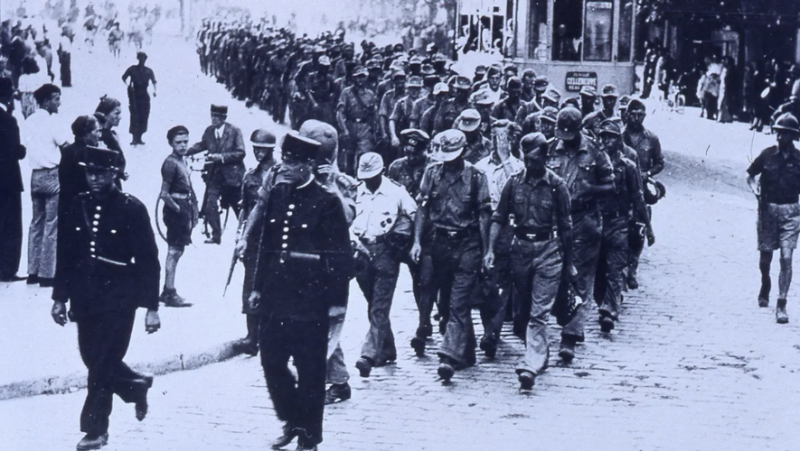On August 24, 1944, a German military column sowed death in the region

Des prisonniers allemands défilent dans Montpellier le 31 août 1944. Archives de Montpellier, 6 S 253
Des cérémonies exceptionnelles et conjointes auront lieu samedi 24 août dans les trois communes de Grabels, Montarnaud et Montferrier-sur-Lez pour commémorer les victimes.
This is a first: the three municipalities of Grabels, Montarnaud and Montferrier-sur-Lez will join forces on Saturday, August 24, to commemorate the victims of August 24, 1944, the day when a German military column sowed death in the region and suffered losses itself.
The three mayors have agreed to present a united commemoration that will take place in the three municipalities. First in Montferrier-sur-Lez from 10:30 a.m. in front of the memorial, with a wreath-laying and a speech. Then in Grabels at 5:30 p.m., on the Bel-Air road in front of the commemorative plaque. The last ceremony of the day, in Montarnaud, will take place at 6:30 p.m., in front of the commemorative monument on Avenue de Montpellier.
Symbolic actions
The joint action of the municipalities also involves an association of cycling clubs for a symbolic ride on the route of the German column. “It's a tribute to Emile Berthomieu, explains Joël Vezhinet, president of the Vélo club grabellois. He was repairing bicycles and was killed on Place de la Fontaine in Grabels because he refused a third theft of one of his bicycles."
The procession, made up of about fifteen people, will be equipped with special bibs and will leave at 9:30 a.m. from the hamlet of Bel-air to cross Grabels and arrive in Montferrier-sur-Lez, at the start of the commemorations.
Another action full of symbolism, a song was written by the students of the schools of the communes to retrace the events, The song of Fescau.
Violent clashes
To understand the events of August 24, 1944, we must turn to the deep voice of Jean-Claude Richard. Historian and honorary research director at the CNRS, he tirelessly narrates the events. “The victims are killed by the so-called Rodez column, which is trying to return urgently to the North and East, following the landings in Normandy and Provence.” The column clashes with militias and the local population. Encounters are often fatal.
In Montarnaud, six people are killed, including two Indochinese. In Grabels, in the hamlet of Bel-Air, negotiations go badly. Captain Ely and two companions manage to escape, four people lose their lives there. The event exasperated the Germans, who decided to set fire to the Paulhan castle in Bel-air, after having locked its inhabitants inside. Luckily, a child was able to get out through a small window and save the others from the flames.
André Belot, originally from Montarnaud and who was returning from Montpellier by bike, was shot, as was Emile Berthomieu, mentioned earlier. The German column would never reach the North, most of the troops being captured in Chomérac, in Ardèche.




